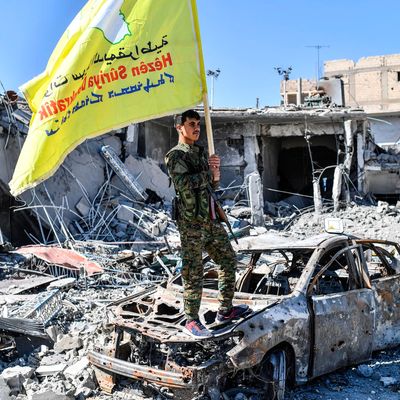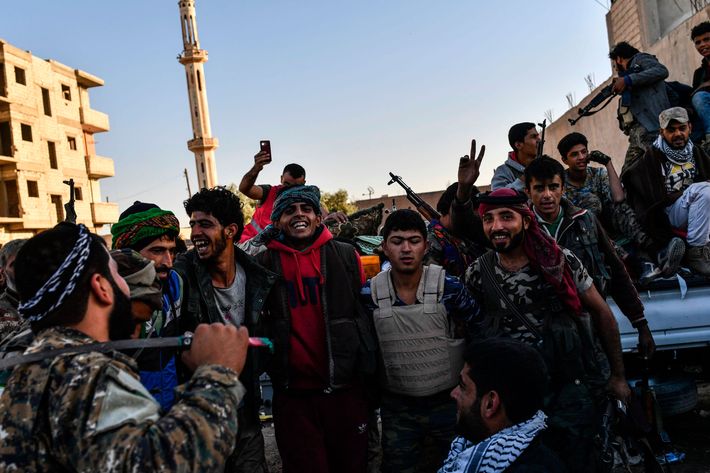
United States–backed forces said Tuesday they have recaptured the city of Raqqa from ISIS, dealing a major blow to the militants that claimed it as the capital of its so-called caliphate. After ISIS’s defeat in Mosul, Iraq, this summer, Raqqa stood alone as jihadists’ last significant urban stronghold. Its apparent liberation stands as a key strategic and symbolic victory over the terror group, and ISIS, once in control of large swaths of territory, is now clinging to a few clusters of land and a strip of real estate that includes parts of Syria’s eastern Deir ez-Zor province and Iraq’s Anbar province.

The battle to retake Raqqa began in June 2017, led by the U.S.-backed Syrian Democratic Forces (SDF), an alliance of Syrian Kurds and Arab fighters. The SDF waged war from the ground for months, while the U.S. backed up their allies from above, pounding the city with air strikes. On Tuesday, a representative for the SDF declared the offensive over. ISIS fighters had either surrendered or been killed by SDF, a spokesman said, whose forces were clearing the city of landmines and rooting out any sleeper cells. SDF still celebrated the hard-won victory, tearing down the ISIS flag from the National Hospital in Raqqa, one of the last landmarks to be cleared of ISIS militants.
The U.S. Central Command has not yet confirmed ISIS’s total defeat, saying “more than 90 percent of Raqqa is in SDF control.” Some small pockets of ISIS resistance may remain.
President Donald Trump, in an interview with radio talk-show host Chris Plante, attributed the (not-yet-confirmed by the military) victory over ISIS to himself. “I totally changed rules of engagement. I totally changed our military, I totally changed the attitudes of the military and they have done a fantastic job,” he said. “ISIS is now giving up, they are giving up, they are raising their hands, they are walking off. Nobody has ever seen that before.”
But the hard task of restoring Raqqa still awaits. The city had been under ISIS’s control since 2014, its residents brutalized by their terror regime. Months of air strikes and ground fighting have left the city in ruins. An estimated 1,000 civilians have been killed in the months-long offensive, and more than 270,000 displaced, reports the New York Times.
The fate of the ISIS fighters, especially those foreign militants, is still uncertain. Reports suggested that the two sides had negotiated a settlement that would have allowed the last ISIS fighters to evacuate. The U.S. has denied those reports, saying any buses leaving the city were reserved for civilians. Still, as ISIS clings to its remaining territory, the fear remains that these remaining militants, who can blend in with the general population in Syria and Iraq, will change tactics and wage a deadly insurgency from within. There’s also real concern that the thousands of foreigners who flocked to Syria to join up with ISIS will return to their homes in Europe or Central Asia, and stage attacks from there.
The liberation of Raqqa ends ISIS’s reign, but also lays bare a new set of conflicts. The Syrian Democratic Forces are a somewhat uneasy alliance of Syrian Kurds and Arab fighters; now that the common enemy is defeated, who will control the city? ISIS is also under siege from Russian- and Iran-backed Syrian government forces in Deir ez-Zor, where Syrian president Bashar al-Assad is trying to consolidate his control over the country once gain. That underlying conflict — the Syrian civil war, now in its sixth year — won’t go away with ISIS’s defeat. Instead, it opens up the potential for a scramble for territory. (U.S.-backed forces, for example, have already claimed they’ve come under siege from Russian aircraft this fall near Deir ez-Zor.) And kicking ISIS off the map is one thing; taking out its ideology another. The conditions that fueled the extremist group’s rise remain as potent as ever in war-torn Syria.





























